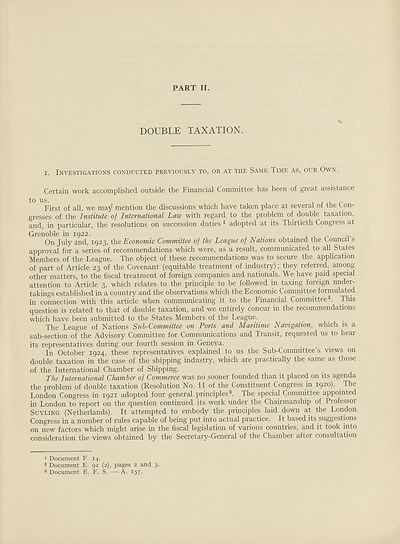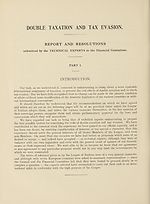Download files
Complete book:
Individual page:
Thumbnail gallery: Grid view | List view

PART II.
DOUBLE TAXATION.
i. Investigations conducted previously to, or at the Same Time as, our Own.
Certain work accomplished outside the Financial Committee has been of great assistance
First of ah, we may mention the discussions which have taken place at several of the Con¬
gresses of the Institute of International Law with regard to the problem of double taxation,
and, in particular, the resolutions on succession duties 1 adopted at its Thirtieth Congress at
Grenoble in 1922. ,
On July 2nd, 1923, the Economic Committee of the League of I\ ations obtained the Council s
approval for a series of recommendations which were, as a result, communicated to all States
Members of the League. The object of these recommendations was to secure the application
of part of Article 23 of the Covenant (equitable treatment of industry); they referred, among
other matters, to the fiscal treatment of foreign companies and nationals. We have paid special
attention to Article 3, which relates to the principle to be followed in taxing foreign under¬
takings established in a country and the observations which the Economic Committee formulated
in connection with this article when communicating it to the Financial Committee2. This
question is related to that of double taxation, and we entirely concur in the recommendations
which have been submitted to the States Members of the League.
The League of Nations Sub-Committee on Ports and Maritime Navigation, which is a
sub-section of the Advisory Committee for Communications and Transit, requested us to hear
its representatives during our fourth session in Geneva.
In October 1924, these representatives explained to us the Sub-Committee’s views on
double taxation in the case of the shipping industry, which are practically the same as those
of the International Chamber of Shipping.
The International Chamber of Commerce was no sooner founded than it placed on its agenda
the problem of double taxation (Resolution No. 11 of the Constituent Congress in 1920). The
London Congress in 1921 adopted four general principles3. The special Committee appointed
in London to report on the question continued its work under the Chairmanship of 1 rofessor
Suyling (Netherlands). It attempted to embody the principles laid down at the London
Congress in a number of rules capable of being put into actual practice. It based its suggestions
on new factors which might arise in the fiscal legislation of various countries, and it took into
consideration the views obtained by the Secretary-General of the Chamber after consultation
1 Document F. 14.
2 Document E. 92 (2), pages 2 and 3.
3 Document E. F. S. — A. 157.
DOUBLE TAXATION.
i. Investigations conducted previously to, or at the Same Time as, our Own.
Certain work accomplished outside the Financial Committee has been of great assistance
First of ah, we may mention the discussions which have taken place at several of the Con¬
gresses of the Institute of International Law with regard to the problem of double taxation,
and, in particular, the resolutions on succession duties 1 adopted at its Thirtieth Congress at
Grenoble in 1922. ,
On July 2nd, 1923, the Economic Committee of the League of I\ ations obtained the Council s
approval for a series of recommendations which were, as a result, communicated to all States
Members of the League. The object of these recommendations was to secure the application
of part of Article 23 of the Covenant (equitable treatment of industry); they referred, among
other matters, to the fiscal treatment of foreign companies and nationals. We have paid special
attention to Article 3, which relates to the principle to be followed in taxing foreign under¬
takings established in a country and the observations which the Economic Committee formulated
in connection with this article when communicating it to the Financial Committee2. This
question is related to that of double taxation, and we entirely concur in the recommendations
which have been submitted to the States Members of the League.
The League of Nations Sub-Committee on Ports and Maritime Navigation, which is a
sub-section of the Advisory Committee for Communications and Transit, requested us to hear
its representatives during our fourth session in Geneva.
In October 1924, these representatives explained to us the Sub-Committee’s views on
double taxation in the case of the shipping industry, which are practically the same as those
of the International Chamber of Shipping.
The International Chamber of Commerce was no sooner founded than it placed on its agenda
the problem of double taxation (Resolution No. 11 of the Constituent Congress in 1920). The
London Congress in 1921 adopted four general principles3. The special Committee appointed
in London to report on the question continued its work under the Chairmanship of 1 rofessor
Suyling (Netherlands). It attempted to embody the principles laid down at the London
Congress in a number of rules capable of being put into actual practice. It based its suggestions
on new factors which might arise in the fiscal legislation of various countries, and it took into
consideration the views obtained by the Secretary-General of the Chamber after consultation
1 Document F. 14.
2 Document E. 92 (2), pages 2 and 3.
3 Document E. F. S. — A. 157.
Set display mode to:
![]() Universal Viewer |
Universal Viewer | ![]() Mirador |
Large image | Transcription
Mirador |
Large image | Transcription
Images and transcriptions on this page, including medium image downloads, may be used under the Creative Commons Attribution 4.0 International Licence unless otherwise stated. ![]()
| League of Nations > Economic and financial section > Double taxation and tax evasion > (13) |
|---|
| Permanent URL | https://digital.nls.uk/190911477 |
|---|
| Shelfmark | LN.II |
|---|
| Description | Over 1,200 documents from the non-political organs of the League of Nations that dealt with health, disarmament, economic and financial matters for the duration of the League (1919-1945). Also online are statistical bulletins, essential facts, and an overview of the League by the first Secretary General, Sir Eric Drummond. These items are part of the Official Publications collection at the National Library of Scotland. |
|---|---|
| Additional NLS resources: |
|

